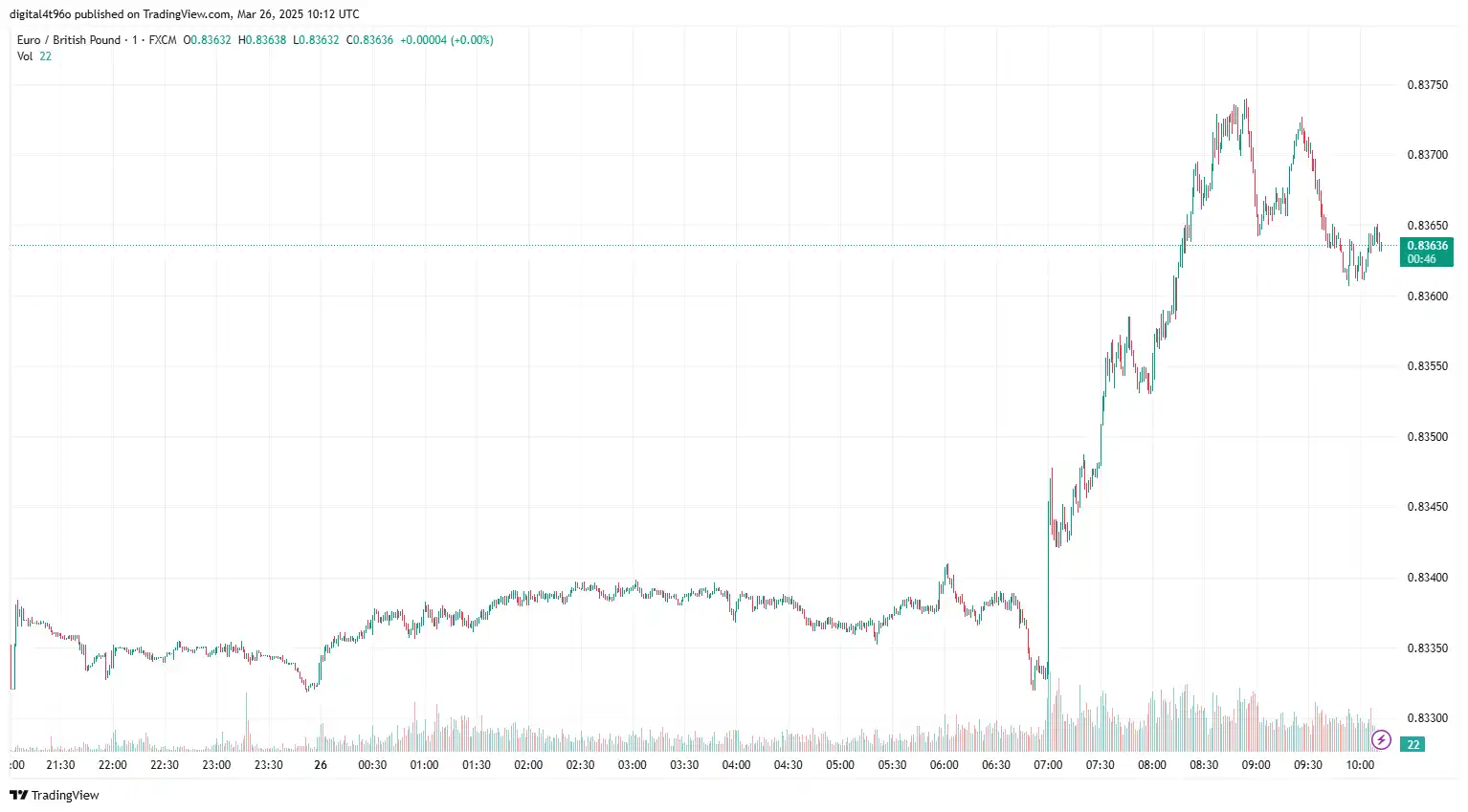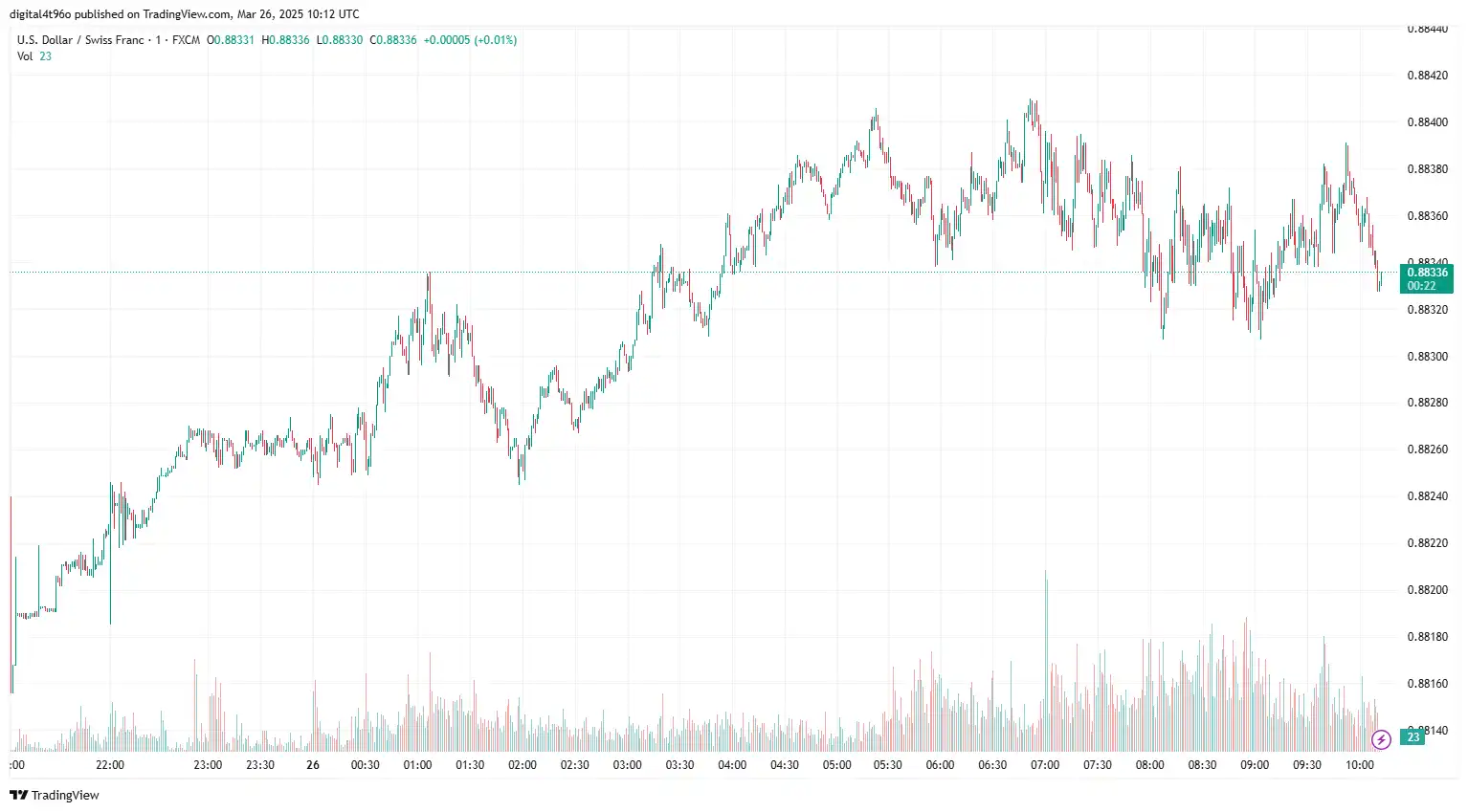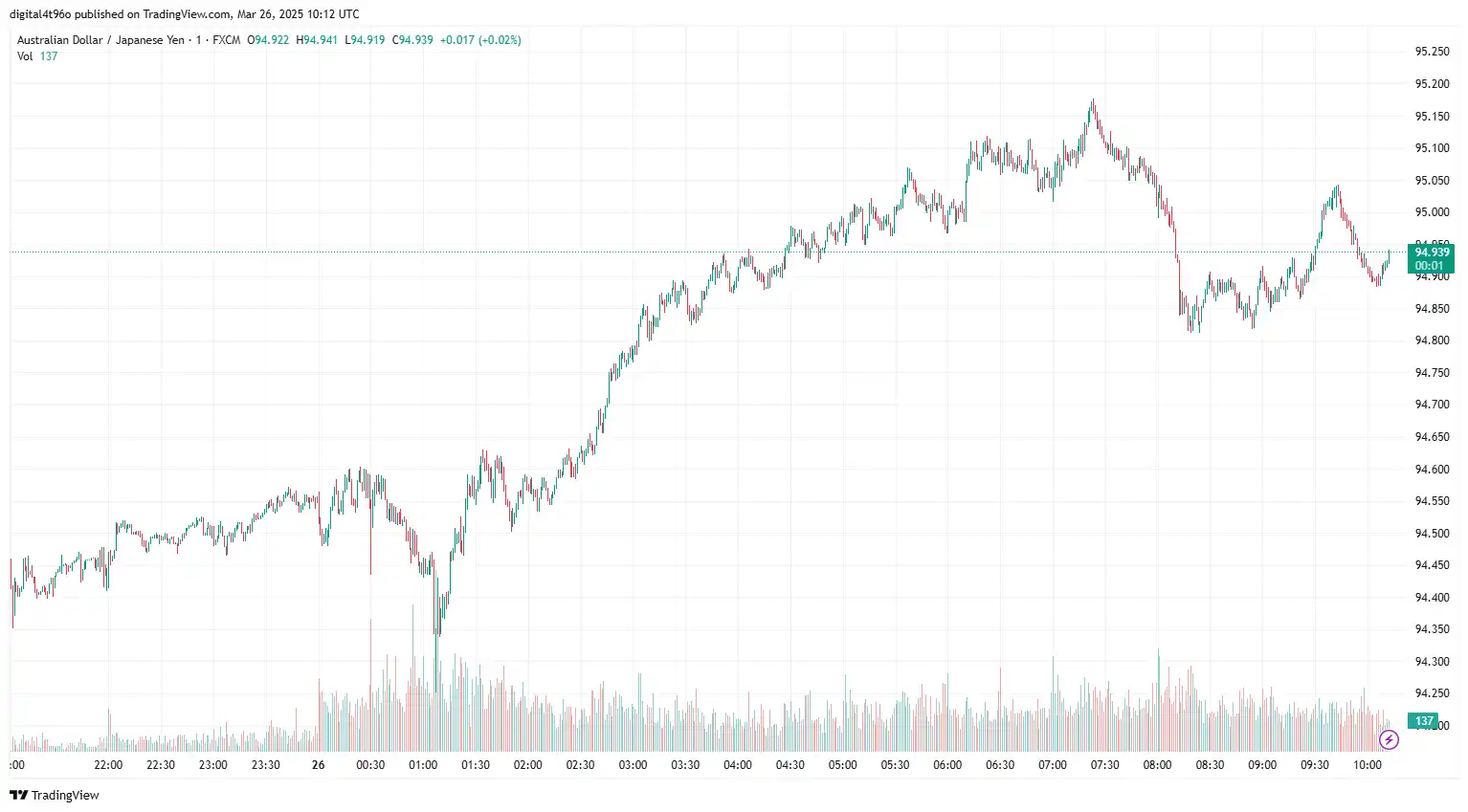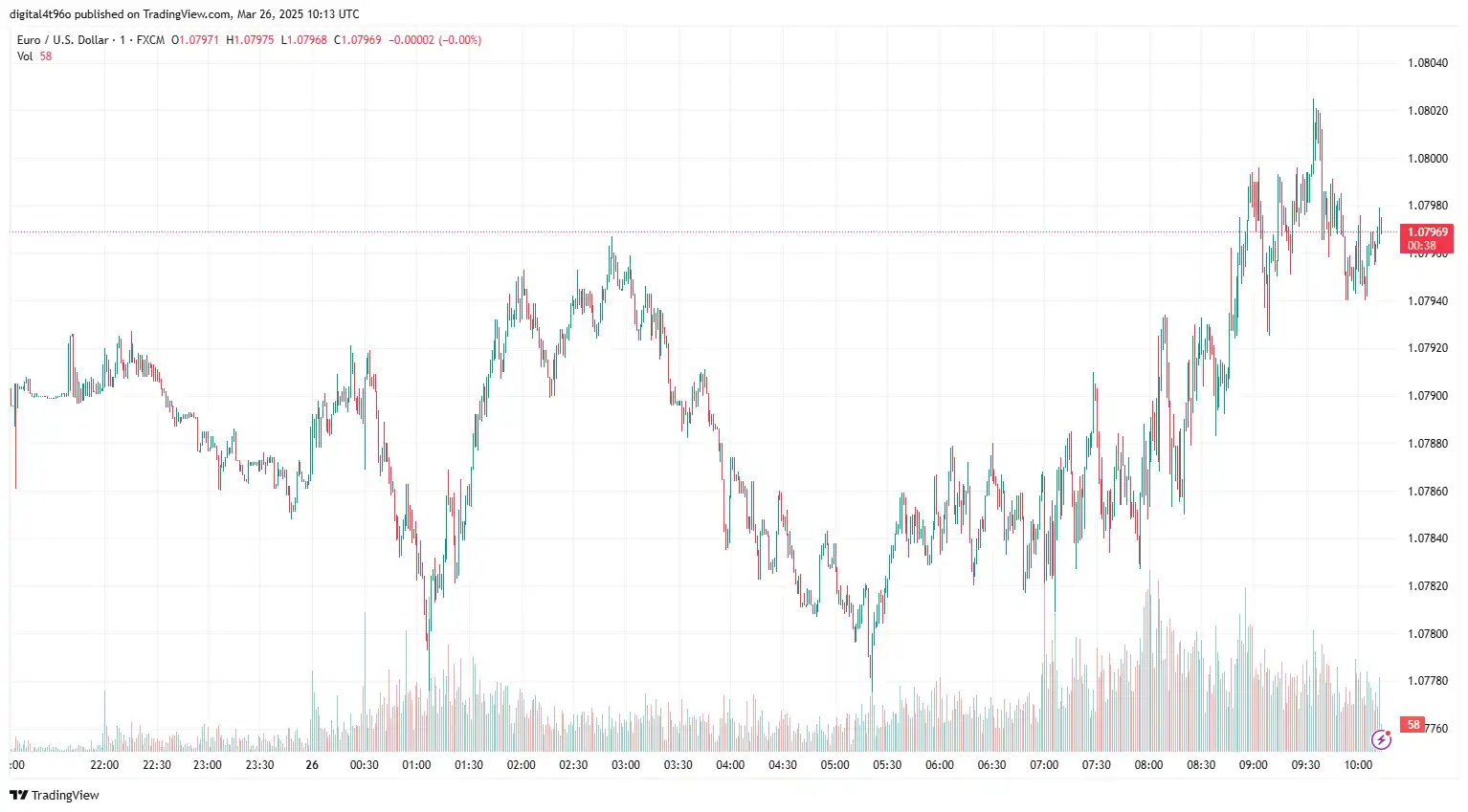EUR/GBP Buoyed Following Weak UK CPI Data
EUR/GBP appreciated near 0.8358 following the release of disappointing inflation data from the United Kingdom (UK). The UK Consumer Price Index (CPI) increased by 2.8% year-on-year (YoY) in February, following a 3.0% rise in January, according to data released by the Office for National Statistics (ONS) on Wednesday. Markets had anticipated a growth of 2.9% during the reported period. This reading remained significantly above the Bank of England's (BoE) target of 2%. The core CPI, which excludes volatile food and energy items, rose at an annual rate of 3.5% in the same period, compared to a 3.7% increase in January, falling short of the market forecast of 3.6%. Services inflation remained unchanged at 5% YoY in February. Meanwhile, the monthly UK CPI inflation rebounded to 0.4% in February from -0.1% in January, with markets estimating a reading of 0.5%. Softer inflation data will heighten market speculation regarding the Bank of England's (BoE) policy outlook, prompting a potential monetary policy easing. Investors are also keenly awaiting the UK Chancellor of the Exchequer Rachel Reeves's Spring Statement for insights on the pound's movement. Reeves is expected to reduce welfare spending, having pledged to avoid tax increases and committed to relying solely on foreign investment financing. She is also anticipated to announce a £2.2 billion increase in defence spending amidst the ongoing uncertainty surrounding the Ukraine war.
Conversely, the euro faces continuous pressure as expectations rise that the European Central Bank (ECB) may cut interest rates again in April. On Tuesday, ECB Governing Council member François Villeroy de Galhau commented that further rate cuts are possible and that the 2.5% deposit rate could drop to 2% by the summer's end. Recent economic data revealed that the HCOB flash composite output index rose to 50.4 from 50.2 in February, showing an expansion above 50.0 for the third month. However, the flash services PMI fell to a four-month low of 50.4, down from 50.6, missing the expected increase to 51.2. The flash factory PMI reached a 26-month high of 48.7, up from 47.6, surpassing expectations of 48.3. Germany's private sector grew fastest in ten months, with the flash HCOB composite output index climbing to 50.9. Manufacturing production rebounded robustly, while the services sector slowed as the services PMI decreased to 50.2 from 51.1. The manufacturing PMI improved to 48.3 from 46.5, exceeding the forecast of 47.1. In France, the economic downturn slowed, aided by improvements in manufacturing. The HCOB composite output index hit a two-month high of 47.0, up from 45.1. The services PMI rose more than expected to 46.6 from 45.3, while the manufacturing PMI surged to 48.9, the highest in 26 months, from 45.8. The Ifo Business Climate Index for Germany increased to 86.7 in March from 85.2, slightly below the anticipated 86.8.
In today's session, the UK's Budget Report and UK Chancellor of the Exchequer Rachel Reeves's speech will influence the EUR/GBP's movements.

USD/CHF Rebounds on Stronger US Dollar
USD/CHF recovered near 0.8837 as the US Dollar found support from cautious market sentiment ahead of Trump's tariff announcement on April 2. While the market anticipates that Trump's tariff agenda could boost the inflationary pressures, leading the US economy to a recession, the Federal Reserve's (Fed) monetary policy outlook remains a crucial factor steering the market sentiment. Hawkish comments from Federal Reserve (Fed) Governor Adriana Kugler further strengthen the USD. On Tuesday, Kugler emphasised that the Fed's monetary policy remains restrictive and suitably positioned. She also remarked that progress towards the 2% inflation target has slowed since last summer, noting the recent increase in goods inflation as "unhelpful." On the data front, the Richmond Fed's manufacturing index declined sharply to -4 in March from +6 in February. This drop reflects weaker shipments and new orders, with the new orders index falling to -4 and the employment index slipping to -1. The negative reading suggests a contraction in the manufacturing sector. Consumer confidence also hit in March, dropping to 92.9 from 94.2 in February. This marks the fourth consecutive decline, with both the Present Situation Index (down 3.6 points to 134.5) and the Expectations Index (down 9.6 points to 65.2) showing signs of deterioration. New home sales increased by 1.8% in February, surpassing market expectations of a 0.5% rise. This uptick suggests continued strength in the housing market, offering optimism amid the broader economic slowdown.
On the geopolitical front, geopolitical tensions in the Middle East could boost safe-heave flows, enhancing the demands for both the US Dollar and the Swiss Franc (CHF). On Monday, Switzerland's account surplus narrowed to CHF 9.8 billion in Q4 2024, down from CHF 13.8 billion in the same period the previous year. Meanwhile, the services' account deficit widened to CHF 9.4 billion from CHF 8.7 billion, while the goods account surplus grew to CHF 30 billion from CHF 27.9 billion a year earlier. Last week, the Swiss National Bank (SNB) reduced its key policy interest rate by 25 basis points to 0.25%, marking the lowest level since September 2022, in response to persistently low inflation. The Swiss government has downgraded its GDP growth forecast for 2025 to 1.4% from the previous 1.5%, citing concerns over potential global trade tensions. UBS has also lowered its 2025 GDP growth forecast for Switzerland to 1.3% from 1.5%, attributing the revision to a weaker-than-expected recovery in the Eurozone, a key trading partner, which adds uncertainty to the Swiss franc.
In the upcoming sessions, market sentiment around the geopolitical tensions in the Middle East and Trump's forthcoming tariff will shape the market sentiment, influencing the USD/CHF exchange rate.

AUD/JPY Rebounds on Copper Futures Rise
AUD/JPY gained near 95.01, as rising Copper futures prices marked a record high above $5.20 per pound, supporting the commodity-linked Australian Dollar (AUD). However, the unexpected downward momentum in inflationary pressures limited the Aussie's upside. Australia's monthly Consumer Price Index (CPI) rose by 2.4% in the year to February, compared to a 2.5% rise seen in January, slightly below the market forecast of 2.5% growth. On Tuesday, Australian Treasurer Jim Chalmers revealed the 2025/26 budget, which includes significant economic forecasts and tax reductions amounting to around A$17.1 billion over two phases. The budget deficit is anticipated to be A$27.6 billion for 2024-25 and A$42.1 billion for 2025-26. The GDP growth rate is projected at 2.25% for the fiscal year 2026 and 2.5% in 2027. These tax cuts seem designed to bolster political backing. Australia's preliminary March PMIs exceeded expectations, with manufacturing at a 29-month high of 52.6 and services at a two-month peak of 51.2. The Composite index rose to 51.3, its highest since August, while increasing private sector employment suggests that February's disappointing labour market report may not signal a lasting downturn.
On the policy front, the market anticipates that the Reserve Bank of Australia (RBA) will maintain interest rates next week following its initial rate cut of 25 basis points in four years this past February. RBA Assistant Governor Sarah Hunter reiterated the central bank's cautious approach towards any further cuts, emphasising that February's policy statement suggested a more prudent strategy than what the market had expected, particularly in relation to US policy decisions and their impact on Australia's inflation outlook.
The Japanese Yen (JPY) fluctuated on softer domestic data and market expectations that the Bank of Japan (BoJ) will persist in raising interest rates amid hopes that robust wage growth would support consumption and influence broader inflation trends. The Services Producer Price Index (PPI) – a key indicator of inflation within Japan's service sector – increased by 3.0% year-on-year in February. This figure was slightly lower than the 3.1% rise observed in January. Month-over-month, the index showed no change for the reported month, having decreased by 0.5% in January. Early Wednesday, Governor Kazuo Ueda of the Bank of Japan (BoJ) stated that the Japanese central bank will keep increasing interest rates if economic conditions and price changes align with its predictions.
In the absence of key economic data from regions, broader market sentiment around copper prices will drive the AUD/JPY's movements.

EUR/USD Subdued Despite Positive German Data
EUR/USD traded near 1.0796, as the Greenback weakened due to softer US economic data and the uncertainty surrounding US President Donald Trump's trade policy. On Tuesday, the US Conference Board (CB) announced that one-year consumer inflation expectations rose to 6.2% in March, up from 5.8% in February. Additionally, the CB's consumer confidence survey showed a decline in future economic expectations, falling to a new 12-year low of 65.2 in March, well below the 80.0 threshold that typically signals a potential recession. The Richmond Fed's manufacturing index fell sharply to -4 in March from +6 in February. This decline reflects weakened shipments and new orders, with the new orders index decreasing to -4 and the employment index slipping to -1. The negative figure indicates a contraction in the manufacturing sector. Consumer confidence also suffered in March, dropping to 92.9 from 94.2 in February. Additionally, ongoing uncertainty regarding Trump's reciprocal tariff plans for next week may undermine the pound in the short term. Trump stated late on Monday that not all tariffs would be imposed by the April 2 deadline, and some countries would receive exemptions, though he did not provide further details.
On the other hand, dovish comments from the European Central Bank (ECB) policymakers may weigh on the euro. The ECB Governing Council member, François Villeroy de Galhau, stated late on Tuesday that there remains potential for further interest rate cuts, suggesting that the 2.5% deposit rate could decrease to 2% by the end of the summer. On Wednesday, European Central Bank (ECB) official Fabio Panetta stated that the central bank must remain pragmatic and data-driven when determining the policy rate. He emphasised that the ECB should prioritise inflation expectations over the estimated neutral level for setting rates. With inflation declining and rates approaching neutrality, the issue of uncertainty becomes increasingly significant. Recently, the Ifo Business Climate Index for Germany, which measures sentiment among German businesses about current conditions and future expectations, increased to 86.7 points in March from 85.2 in February, slightly below the expected 86.8.
In today's session, US Durable Goods Orders and speeches by influential FOMC members will drive the EUR/USD exchange rate.

Stay Ahead in the Currency Game
Whether you're a daily FX trader or handle international transactions regularly, our 'Currency Pulse' newsletter delivers the news you need to make more informed decisions. Receive concise updates and in-depth insights directly in your LinkedIn feed.
Subscribe to 'Currency Pulse' now and never miss a beat in the currency markets!
Ready to act on today’s insights? Get a free quote or give us a call on: +44 (0)20 7740 0000 to connect with a dedicated portfolio manager for tailored support.
Important: This blog is for informational purposes only and should not be considered financial advice. Currency Solutions does not consider individual investment goals, financial circumstances, or specific requirements of readers. We do not endorse or recommend any particular financial strategies or products discussed. Currency Solutions provides this content as is, without any guarantees of completeness, accuracy, or timeliness.




